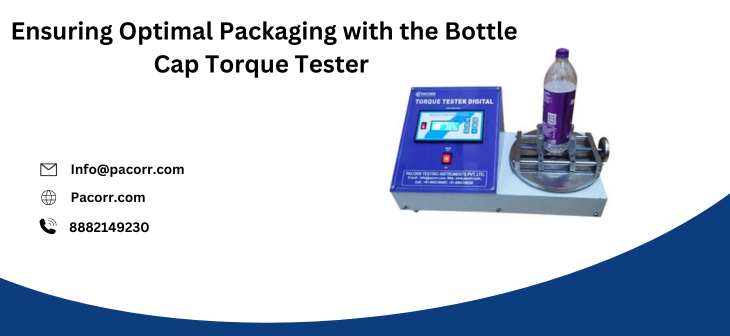In the modern packaging industry, ensuring that containers are securely sealed is essential to maintaining product quality and meeting regulatory standards. One critical tool in achieving this is the Bottle Cap Torque Tester price. These devices measure the force required to tighten or loosen bottle caps, providing invaluable insights into packaging performance and reliability. At Pacorr.com, we specialize in providing high-quality torque testing equipment to help businesses maintain excellence in their packaging processes.
This article explores every aspect of bottle cap torque testers, their importance, how they function, and why they are a must-have for industries focused on quality control.
What Are Bottle Cap Torque Testers?
A bottle cap torque tester is a precision instrument used to evaluate the strength and functionality of bottle closures. It determines whether a cap is applied with the correct amount of force, ensuring optimal sealing without compromising user convenience. These devices are essential for detecting potential issues such as leaks, improper sealing, or caps that are too tight to open easily.
The Importance of Torque Testing in Packaging
1. Leak Prevention
Poorly sealed bottles can lead to product leakage, causing waste, contamination, or customer dissatisfaction. Torque testers ensure that closures meet exact force specifications for a proper seal.
2. Compliance with Regulations
Industries such as pharmaceuticals, food production, and cosmetics must meet stringent packaging standards. Torque testing ensures caps meet regulatory requirements for safety and tamper resistance.
3. Enhancing Customer Experience
Easy-to-open packaging is a priority for many consumers. By testing and adjusting torque levels, manufacturers can provide packaging that balances security with convenience.
4. Cost Efficiency
Detecting torque-related packaging flaws early reduces the chances of product recalls or costly redesigns, saving time and money for manufacturers.
Features of Advanced Bottle Cap Torque Testers
Modern torque testers come with a range of features that make them indispensable for quality control:
- Accurate Sensors: Advanced sensors ensure precise torque measurements for consistent results.
- Versatile Design: Adjustable clamping systems accommodate bottles of various shapes and sizes.
- Digital Interfaces: Clear, easy-to-read displays simplify the testing process.
- Data Storage and Connectivity: Test data can be recorded and integrated into quality management systems for analysis.
- Durability: Designed for long-term use in demanding industrial environments.
Applications Across Industries
Bottle Cap Torque Tester are widely used in various sectors to maintain packaging integrity:
- Pharmaceuticals: Ensures safety seals and child-resistant closures comply with industry requirements.
- Food and Beverages: Maintains freshness and prevents leakage in bottles with twist-off caps, screw caps, and tamper-evident lids.
- Cosmetics and Personal Care: Protects product quality by testing the sealing strength of jars and bottles for creams, perfumes, and lotions.
- Chemical Products: Secures hazardous substances in containers, preventing spills during transport or storage.
Types of Bottle Cap Torque Testers
- Manual Models
- Simple and affordable.
- Ideal for low-volume operations or spot checks.
- Digital Models
- Equipped with sensors for greater accuracy and repeatability.
- Suitable for industries requiring precise measurements.
- Motorized Models
- Automated for consistent and high-speed testing.
- Perfect for high-volume production lines.
- Customizable Options
- Tailored designs for unique packaging needs or non-standard bottle shapes.
Steps for Using a Bottle Cap Torque Tester
Operating a Drop Tester is straightforward and requires minimal training:
- Position the Bottle: Securely place the bottle within the tester’s clamps.
- Set Parameters: Select whether you’re measuring the force to tighten or remove the cap.
- Execute the Test: Activate the device to measure the torque applied.
- Review Data: Analyze the results to confirm they meet required specifications.
Why Choose Pacorr for Torque Testers?
At Pacorr.com, we are dedicated to providing high-performance torque testing solutions. Here’s what sets us apart:
- Expertise You Can Trust: Years of experience in packaging quality control.
- Tailored Solutions: Whether you need a standard model or a customized tester, we’ve got you covered.
- Reliability: Our products are designed for accuracy and long-term use.
- Comprehensive Support: From product selection to after-sales service, we are with you every step of the way.
- Value for Money: Competitive pricing without compromising quality.
Maintenance Tips for Prolonged Use
To ensure your torque tester operates effectively over time, follow these maintenance practices:
- Calibration: Regular calibration is essential for maintaining accuracy.
- Clean Components: Remove dust and residue to avoid interference with testing.
- Inspect for Wear: Periodically check clamps and sensors for signs of wear or damage.
- Store Correctly: Keep the device in a dry, safe environment when not in use.
Elevate Your Packaging Standards with Pacorr
The Bottle Cap Torque Testing is an invaluable tool for companies committed to delivering reliable and safe products. By measuring and controlling the force applied to closures, businesses can ensure that their packaging meets the highest standards of quality and compliance.
At Pacorr.com, we offer a range of torque testers designed to suit the unique needs of industries worldwide. Explore our product catalog and discover how our solutions can help improve your packaging processes and elevate your brand’s reputation.
Visit us at Pacorr.com today to find the ideal torque tester for your business. Quality and precision are just a click away!
Contact Us:
· Email: Info@pacorr.com
· Phone: 8882149230
· Visit our website at www.pacorr.com for more details on our testing instruments.



